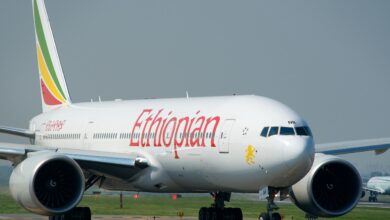Biden’s Angola Visit: U.S Bold Move to Rival China’s Influence in Africa

Joe Biden’s historic visit to Angola marks a pivotal moment in U.S.-Africa relations. This trip, centered on trade and infrastructure, positions Angola as a key player in America’s strategic push to counter China’s growing dominance on the African continent.
With significant investments like the Lobito Corridor project, Biden aims to solidify ties with Angola and neighboring nations, while showcasing a U.S.-led alternative to China’s Belt and Road Initiative.
Why Angola? A Strategic and Historic Visit
Angola holds geopolitical significance due to its oil reserves and rich mineral deposits, including cobalt, lithium, and copper—essential resources for the global transition to clean energy. Biden’s visit underscores Angola’s emergence from decades of civil conflict and its strategic pivot from China and Russia toward the West.
Angola’s Shift in Foreign Policy
Since gaining independence from Portugal in 1975, Angola leaned heavily on China and Russia for economic and military support.
However, President João Lourenço’s administration, starting in 2017, has shifted Angola’s foreign policy from ideological alliances to pragmatic partnerships.
“Lourenço’s administration has seen Angolan foreign policy move away from ideology towards pragmatic multipolarity, becoming truly non-aligned,” notes Alex Vines, Director of the Africa Programme at Chatham House.
Biden is the first U.S. president to visit Angola, marking a significant thaw in relations between the two nations.
The Lobito Corridor: An Ambitious Infrastructure Project
What Is the Lobito Corridor?
The Lobito Corridor is a 1,344-kilometer (835-mile) railway project designed to connect the mineral-rich regions of the Democratic Republic of Congo (DRC) and Zambia to Angola’s Lobito Port on the Atlantic Ocean. This corridor will facilitate the export of cobalt, lithium, and copper to global markets, primarily the U.S. and Europe.
A Key Rival to China’s Belt and Road Initiative
The Lobito Corridor stands as a U.S.-backed alternative to China’s Belt and Road Initiative (BRI), which has tied African economies to Beijing through extensive infrastructure loans. Unlike BRI, the U.S. project emphasizes collaboration among G7 nations and private investors.
Key Features of the Lobito Corridor:
- Phase One: Upgrading the existing railway from Lobito Port to the DRC border.
- Phase Two: Construction of 800 kilometers of new railway within Angola.
- Long-Term Goal: Linking the Atlantic Ocean to the Indian Ocean via Tanzania.
The Lobito Corridor Investment Promotion Authority (IPA) highlights its potential to drive economic growth in Angola, DRC, and Zambia. For more on the project, visit the Lobito Corridor IPA website.
Angola’s Rich Mineral Resources: A Global Asset
Angola’s vast deposits of cobalt and lithium position the nation as a key player in the global shift toward renewable energy and electric vehicles.
- Cobalt: Essential for battery production, the DRC supplies 63% of the world’s cobalt, much of which will flow through the Lobito Corridor.
- Lithium: While demand for lithium fluctuates, its importance for green technology remains high.
- Copper: A critical resource for electrical wiring and renewable energy systems.
Reducing Raw Material Exports
In recent years, African nations have sought to limit raw material exports, favoring local processing to add value to their resources. While this trend could affect the corridor’s profitability, analysts like Anthony Carroll of the U.S. Institute of Peace remain optimistic about its long-term viability.
Also Read: Top 7 Most Protected Presidents in the World (Video)
The U.S. and G7 Commitment
The Lobito Corridor exemplifies the U.S. and G7 nations’ collective commitment to Africa’s development. Helaina Matza, acting special coordinator for the project at the U.S. Department of State, announced a $600 billion investment pledge through 2027.
This funding aims to modernize infrastructure, boost cross-border trade, and foster economic resilience in the region. Initiatives like the Lobito Corridor could redefine how the West engages with Africa.
Angola’s Economic Revival
Rebuilding After Civil War
Angola’s 27-year civil war, which ended in 2002, devastated the country’s infrastructure, including the colonial-era Benguela railway. Post-war reconstruction efforts have seen significant foreign investment, particularly from China, which poured $2 billion into the railway under a controversial “rail-for-oil” deal.
A Shift Away from Chinese Debt
President Lourenço has expressed regret over the terms of past deals with China, calling them “disadvantageous.” Angola is now pursuing more equitable partnerships, aligning with Biden’s vision for transparent and sustainable investment.
Competing Interests: China vs. the U.S.
China’s dominance in Africa is evident, controlling up to 80% of copper mines in the DRC and financing massive infrastructure projects across the continent. The U.S. strategy under Biden seeks to coexist with Chinese-backed initiatives, fostering a multipolar investment environment.
Will the Lobito Corridor Survive Under Trump?
Uncertainty looms over the Lobito Corridor’s future, given the potential shift in U.S. policy under a Trump administration. While the project is designed to counter China, its bipartisan support may ensure continuity.
Angola’s Growing Global Profile
Biden’s visit boosts Angola’s international standing, presenting it as a stable and attractive destination for foreign investment.
“Where the U.S. president goes, the whole world follows,” says Angolan analyst Edmilson Angelo.
With ongoing infrastructure development and a focus on sustainable trade, Angola is poised to play a critical role in regional and global development.
The Broader Impact of the Lobito Corridor
Economic Benefits
- Mineral Exports: Facilitates efficient transport of minerals to global markets.
- Trade Expansion: Enhances cross-border trade among Angola, Zambia, and DRC.
Agricultural Boost
The corridor could also revitalize agriculture along its route, with the African Development Bank investing $500 million to support small businesses and cooperatives.
Strategic Importance
Linking the Atlantic and Indian Oceans, the Lobito Corridor serves as a critical trade artery for Central and Southern Africa.
Conclusion: A Game-Changer for U.S.-Africa Relations
President Biden’s Angola visit signals a transformative shift in U.S.-Africa relations. By prioritizing infrastructure and equitable trade, the U.S. is challenging China’s dominance while promoting sustainable development.
As Angola continues its post-war recovery, the Lobito Corridor emerges as a beacon of hope, symbolizing Africa’s potential to shape its economic destiny.
For more updates on U.S.-Africa relations, visit BBC Africa and The Africa Report.





